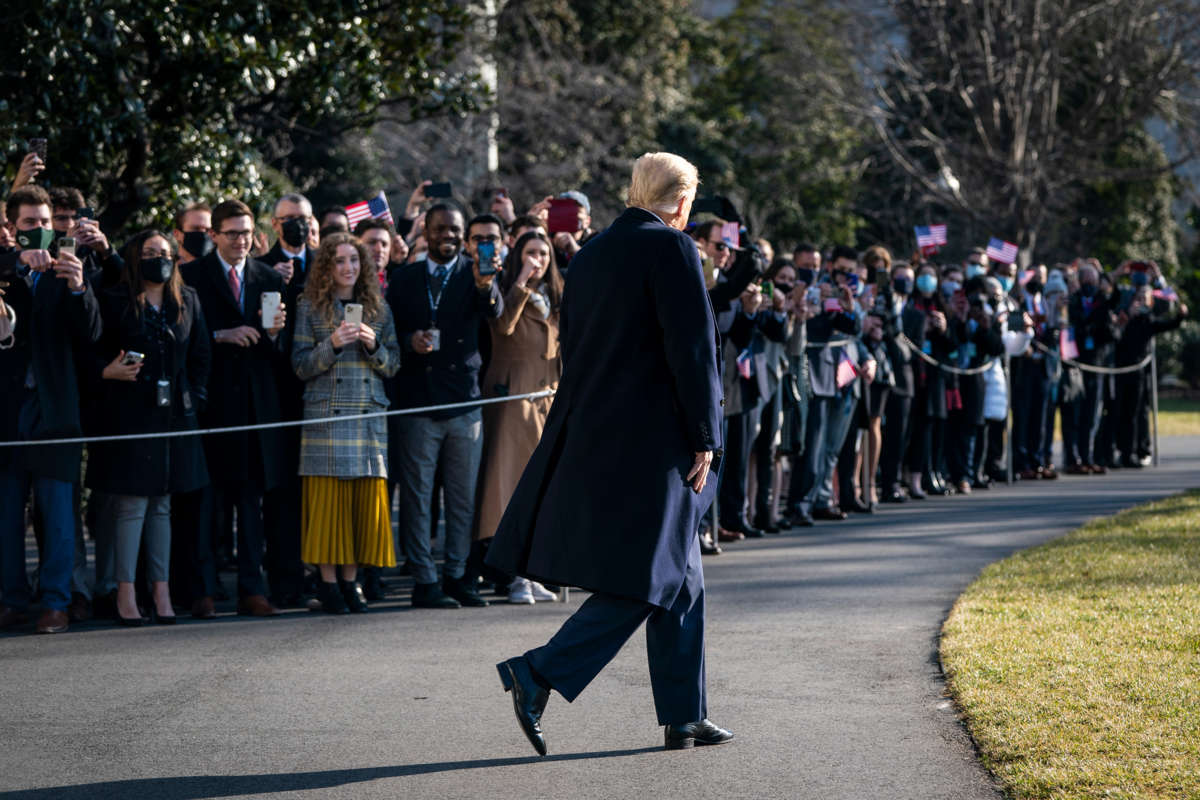Truthout is a vital news source and a living history of political struggle. If you think our work is valuable, support us with a donation of any size.
Donald Trump has been impeached (again) for his incitement of the attack on the U.S. Capitol. In his Senate trial, his lawyers will likely argue that his speech to the mob that day was just a regular political speech that maybe contained a little “hyperbole.” Don’t fall for it.
In the closing days of the 2020 election campaign, we were part of a team of pro bono lawyers who sued Trump for unlawful voter intimidation. As Election Day approached, we — and our lead client, Mi Familia Vota Education Fund, a national nonprofit organization that works to increase civic participation in the Latino community — became increasingly concerned by Trump’s violent rhetoric. He repeatedly called for an armed presence at polling stations to prevent “fraud,” and encouraged supporters — what his campaign called the “Trump Army” — to show up at the polls for nebulous purposes. Trump even told the white supremacist Proud Boys gang to “stand by.”
We sued Trump and two administration officials in federal court in Washington, D.C., charging them with unlawful voter intimidation under the Voting Rights Act of 1965 and the Ku Klux Klan Act of 1871. We noted that Trump had “publicly encouraged vigilante violence,” and that he had “encouraged armed vigilantes to believe that their intervention is necessary and invited by the president and his administration.” We also cited Trump’s repeated public refusals to commit to a peaceful transfer of power if he lost the election. We sought a court order that would, among other things, prohibit Trump from encouraging his supporters to interfere with voting or ballot counting, or from tweeting disinformation about the legality of mail-in voting.
One of the Trump legal team’s main arguments — which ultimately persuaded the judge — is painful to read now. Our lawsuit cited a Trump campaign email inviting supporters to join “the Trump Army” and serve as “the President’s first line of defense when it comes to fighting off the Liberal MOB.” But Trump’s lawyers dismissed this, even in the context of all his other rhetoric, as mere “political hyperbole.” They argued that, “[t]he President’s description of election monitors as an ‘Army for Trump,’ and his directive to supporters to ‘[w]atch those ballots’ and ‘[w]atch all the thieving and stealing and robbing they do’ … are calls for supporters to exercise statutory rights to serve as election monitors or otherwise be vigilant regarding potential voting abuses.” They argued that Trump’s rhetoric wasn’t voter intimidation, but merely “political ‘statements’ that Plaintiffs dislike.” Ultimately, they insisted, the risk of third-party violence was “far too speculative and conjectural.”
The case was assigned to Senior Judge Richard Leon, a longtime fixture in Republican legal circles appointed to the bench by George W. Bush. After a brief telephonic argument, Judge Leon — who sounded annoyed at having to consider the case — opined that the threatened harm was “way too speculative” and ruled against us.
Were we wrong? Election Day itself was mostly peaceful. But the court order that we sought would also have prohibited Trump from urging supporters to interfere with ballot counting. And Trump-inspired mobs attempted to physically interfere with ballot counting in places such as Philadelphia and Detroit. Meanwhile, as we had predicted, Trump spent two full months tweeting and imploring officials to throw out validly cast mail-in votes.
Ultimately, we were right about the threat of violence, but wrong about the timing. Trump’s inflammatory rhetoric did lead to violent attacks on our democracy — not on November 3, 2020, but rather on January 6, 2021.
It’s now clear that the “Trump Army” doesn’t understand his words as mere “political hyperbole” innocently inviting supporters to “exercise statutory rights to serve as election monitors.” When Trump told supporters to march to the Capitol to “show strength” and “fight like hell” because “you’ll never take back our country with weakness,” they understood perfectly well.
Yet in the Senate impeachment trial, Trump’s defenders will surely cite his perfunctory disclaimer about marching “peacefully.” And they’ll most likely claim, incorrectly, that a 1969 Supreme Court case gives the president of the United States the unqualified right to incite a violent assault that left five dead and very nearly led to a massacre.
Unless the Senate convicts and disqualifies Trump from running for office in the future, he may well run again in 2024. Recent polling of Republicans and Republican-leaning independents shows that — while many have turned away in disgust — he still leads the Republican primary field by miles. His hardcore supporters have tasted blood, and he’s likely to incite even more violence if allowed the chance. After January 6, no one can call that “speculative.”
A terrifying moment. We appeal for your support.
In the last weeks, we have witnessed an authoritarian assault on communities in Minnesota and across the nation.
The need for truthful, grassroots reporting is urgent at this cataclysmic historical moment. Yet, Trump-aligned billionaires and other allies have taken over many legacy media outlets — the culmination of a decades-long campaign to place control of the narrative into the hands of the political right.
We refuse to let Trump’s blatant propaganda machine go unchecked. Untethered to corporate ownership or advertisers, Truthout remains fearless in our reporting and our determination to use journalism as a tool for justice.
But we need your help just to fund our basic expenses. Over 80 percent of Truthout’s funding comes from small individual donations from our community of readers, and over a third of our total budget is supported by recurring monthly donors.
Truthout’s fundraiser ended last night, and we fell just short of our goal. But your support still matters immensely. Whether you can make a small monthly donation or a larger one-time gift, Truthout only works with your help.
